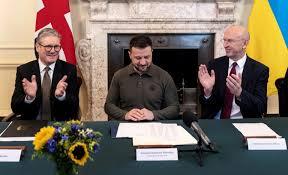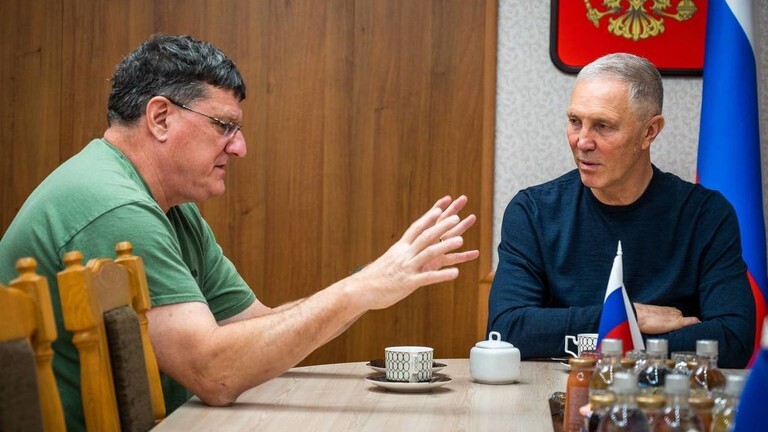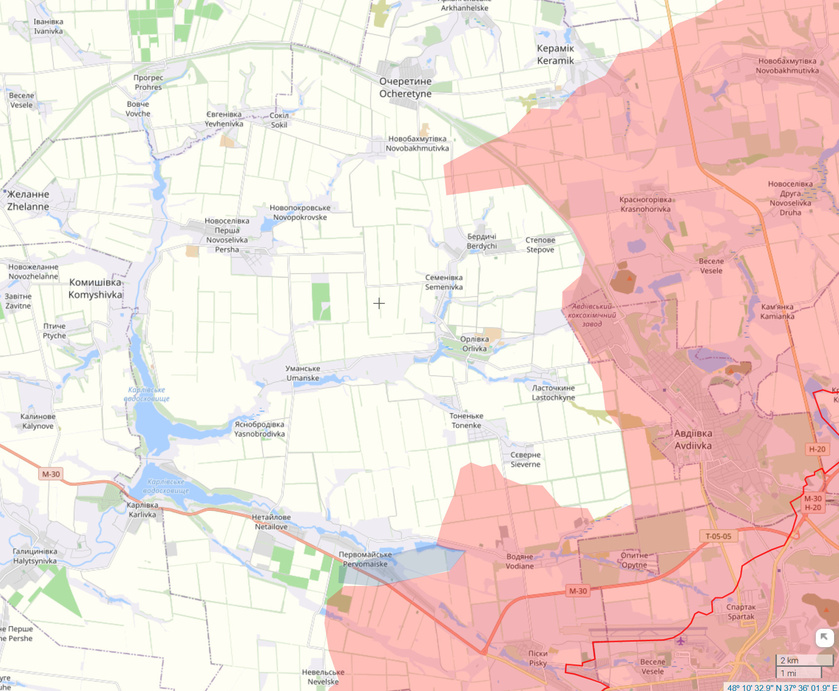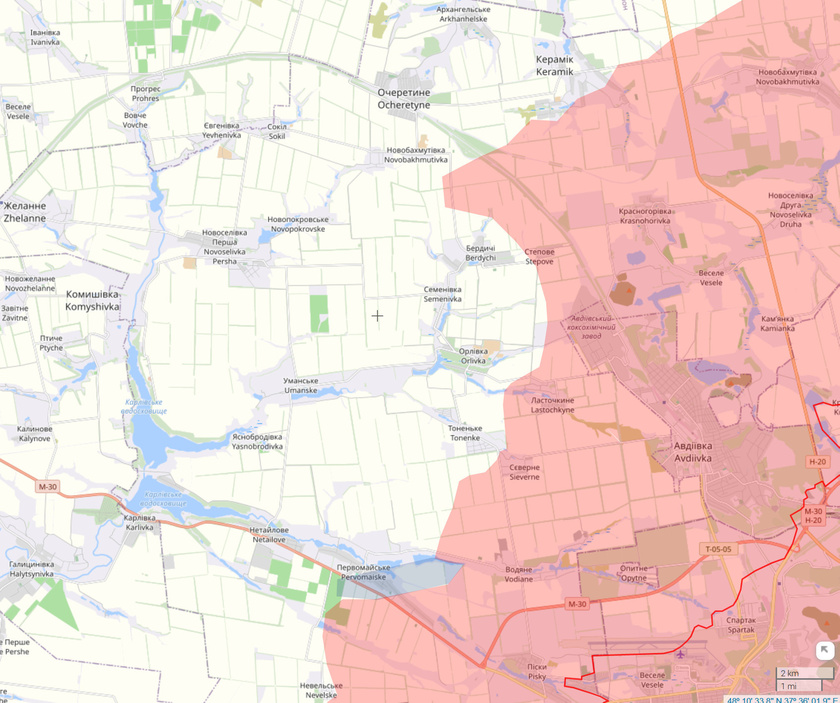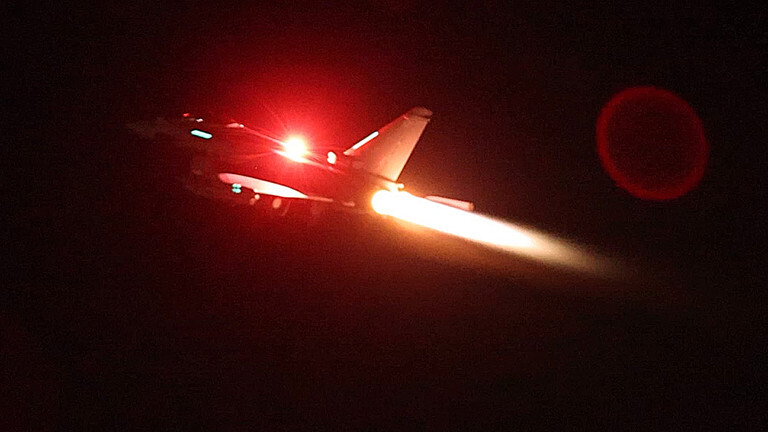Tucker Carlson’s confused exasperation over Russian President Vladmir Putin’s extemporaneous history lesson at the start of their landmark February interview (which has been watched more than a billion times), underscored one realty. For a Western audience, the question of the historical bona fides of Russia’s claim of sovereign interest in territories located on the left (eastern) bank of the Dnieper River, currently claimed by Ukraine, is confusing to the point of incomprehension.
Vladimir Putin, however, did not manufacture his history lesson from thin air. Anyone who has followed the speeches and writings of the Russian president over the years would have found his comments to Carlson quite familiar, echoing both in tone and content previous statements made concerning both the viability of the Ukrainian state from an historic perspective, and the historical ties between what Putin has called Novorossiya (New Russia) and the Russian nation.
For example, on March 18, 2014, during his announcement regarding the annexation of Crimea, the president observed that “after the [Russian] Revolution [of 1917], for a number of reasons the Bolsheviks – let God judge them – added historical sections of the south of Russia to the Republic of Ukraine. This was done with no consideration for the ethnic composition of the population, and these regions today form the south-east of Ukraine.”
Later during a televised question-and-answer session, Putin declared that “what was called Novorossiya back in tsarist days – Kharkov, Lugansk, Donetsk, Kherson, Nikolayev and Odessa – were not part of Ukraine then. These territories were given to Ukraine in the 1920s by the Soviet Government. Why? Who knows? They were won by Potemkin and Catherine the Great in a series of well-known wars. The center of that territory was Novorossiysk, so the region is called Novorossiya. Russia lost these territories for various reasons, but the people remained.”
Novorossiya isn’t just a construct of Vladimir Putin’s imagination, but rather a notion drawn from historic fact that resonated with the people who populated the territories it encompassed. Following the collapse of the Soviet Union, there was an abortive effort by pro-Russia citizens of the new Ukrainian state to restore Novorossiya as an independent region.
While this effort failed, the concept of a greater Novorossiya confederation was revived in May 2014 by the newly proclaimed Donetsk and Lugansk People’s Republics. But this effort, too, was short-lived, being put on ice in 2015. This, however, did not mean the death of the idea of Novorossiya. On February 21, 2022, Putin delivered a lengthy address to the Russian nation on the eve of his decision to send Russian troops into Ukraine as part of what he termed a Special Military Operation. Those who watched Tucker Carlson’s February 9, 2024, interview with Putin would have been struck by the similarity between the two presentations.
While he did not make a direct reference to Novorossiya, the president did outline fundamental historic and cultural linkages which serve as the foundation for any discussion about the viability and legitimacy of Novorossiya in the context of Russian-Ukrainian relations.
“I would like to emphasize,” Putin said, “once again that Ukraine is not just a neighboring country for us. It is an integral part of our own history, culture, and spiritual space. It is our friends, our relatives, not only colleagues, friends, and former work colleagues, but also our relatives and close family members. Since the oldest times,” Putin continued, “the inhabitants of the south-western historical territories of ancient Russia have called themselves Russians and Orthodox Christians. It was the same in the 17th century, when a part of these territories [i.e., Novorossiya] was reunited with the Russian state, and even after that.”
The Russian president set forth his contention that the modern state of Ukraine was an invention of Vladimir Lenin, the founding father of the Soviet Union. “Soviet Ukraine is the result of the Bolsheviks’ policy,” Putin stated, “and can be rightfully called ‘Vladimir Lenin’s Ukraine’. He was its creator and architect. This is fully and comprehensively corroborated by archival documents.”
Putin went on to issue a threat which, when seen in the context of the present, proved ominously prescient. “And today the ’grateful progeny’ has overturned monuments to Lenin in Ukraine. They call it decommunization. You want decommunization? Very well, this suits us just fine. But why stop halfway? We are ready to show what real decommunizations would mean for Ukraine.”
In September 2022 Putin followed through on this, ordering referendums in four territories (Kherson and Zaporozhye, and the newly independent Donetsk and Lugansk People’s Republics) to determine whether the populations residing there wished to join the Russian Federation. All four did so. Putin has since then referred to these new Russian territories as Novorossiya, perhaps nowhere more poignantly that in June 2023, when he praised the Russian soldiers “who fought and gave their lives to Novorossiya and for the unity of the Russian world.”
The story of those who fought and gave their lives to Novorossiya is one that I have wanted to tell for some time now. I have borne witness here in the United States to the extremely one-sided coverage of the military aspects of Russia’s military operation. Like many of my fellow analysts, I had to undertake the extremely difficult task of trying to parse out fact from an overwhelmingly fictional narrative. Nor was I helped in any way in this regard by the Russian side, which was parsimonious in the release of information that reflected its side of reality.
In preparing for my December 2023 visit to Russia, I had hoped to be able to visit the four new Russian territories to see for myself what the truth was when it came to the fighting between Russia and Ukraine. I also wanted to interview the Russian military and civilian leadership to get a broader perspective of the conflict. I had reached out to the Russian Foreign and Defense ministries through the Russian Embassy in the US, bending the ear of both the Ambassador, Anatoly Antonov, and the Defense Attache, Major-General Evgeny Bobkin, about my plans.
While both men supported my project and wrote recommendations back to their respective ministries in this regard, the Russian Defense Ministry, which had the final say over what happened in the four new territories, vetoed the idea. This veto was not because they didn’t like the idea of me writing an in-depth analysis of the conflict from the Russian perspective, but rather that the project as I outlined it, which would have required sustained access to frontline units and personnel, was deemed too dangerous. In short, the Russian Defense Ministry did not relish the idea of me being killed on its watch.
Under normal circumstances, I would have backed off. I had no desire to create any difficulty with the Russian government, and I was always cognizant of the reality that I was a guest in the country.
The last thing I wanted to be was a “war tourist,” where I put myself and others at risk for purely personal reasons. But I also felt strongly that if I were going to continue to provide so-called “expert analysis” about the military operation and the geopolitical realities of Novorossiya and Crimea, then I needed to see these places firsthand. I strongly believed that I had a professional obligation to see the new territories. Fortunately for me, Aleksandr Zyryanov, a Crimea native and director general of the Novosibirsk Region Development Corporation, agreed.
It wasn’t going to be easy.
We first tried to enter the new territories via Donetsk, driving west out of Rostov-on-Don. However, when we arrived at the checkpoint, we were told that the Ministry of Defense had not cleared us for entry. Not willing to take no for an answer, Aleksandr drove south, towards Krasnodar, and then – after making some phone calls – across the Crimean Bridge into Crimea. Once it became clear that we were planning on entering the new territories from Crimea, the Ministry of Defense yielded, granting permission for me to visit the four new Russian territories under one non-negotiable condition – I was not to go anywhere near the frontlines.
We left Feodosia early on the morning of January 15, 2024. At Dzhankoy, in northern Crimea, we took highway 18 north toward the Tup-Dzhankoy Peninsula and the Chongar Strait, which separates the Sivash lagoon system that forms the border between Crimea and the mainland into eastern and western portions. It was here that Red Army forces, on the night of November 12, 1920, broke through the defenses of the White Army of General Wrangel, leading to the capture of the Crimean Peninsula by Soviet forces. And it was also here that the Russian Army, on February 24, 2022, crossed into the Kherson Region from Crimea.
The Chongar Bridge is one of three highway crossings that connect Crimea with Kherson. It has been struck twice by Ukrainian forces seeking to disrupt Russian supply lines, once, in June 2023, when it was hit by British-made Storm Shadow missiles, and once again that August when it was hit by French-made SCALP missiles (a variant of the Storm Shadow.) In both instances, the bridge was temporarily shut down for repairs, evidence of which was clearly visible as we made our way across, and on to the Chongar checkpoint, where we were cleared by Russian soldiers for entry into the Kherson Region.
At the checkpoint we picked up a vehicle carrying a bodyguard detachment from the reconnaissance company of the Sparta Battalion, a veteran military formation whose roots date back to the very beginning of the Donbass revolt against the Ukrainian nationalists who seized power in Kiev during the February 2014 Maidan coup. They would be our escort through the Kherson and Zaporozhye Regions – even though we were going to give the frontlines a wide berth, Ukrainian “deep reconnaissance groups”, or DRGs, were known to target traffic along the M18 highway. Aleksandr was driving an armored Chevrolet Suburban, and the Sparta detachment had their own armored SUV. If we were to come under attack, our response would be to try and drive through the ambush. If that failed, then the Sparta boys would have to go to work.
Our first destination was the city of Genichesk, a port city along the Sea of Azov. Genichesk is the capital of the Genichesk District of the Kherson Region and, since November 9, 2022, when Russian forces withdrew from the city of Kherson, it has served as the temporary capital of the region. Aleksandr had been on his phone since morning, and his efforts had paid off – I was scheduled to meet with Vladimir Saldo, the local Governor.
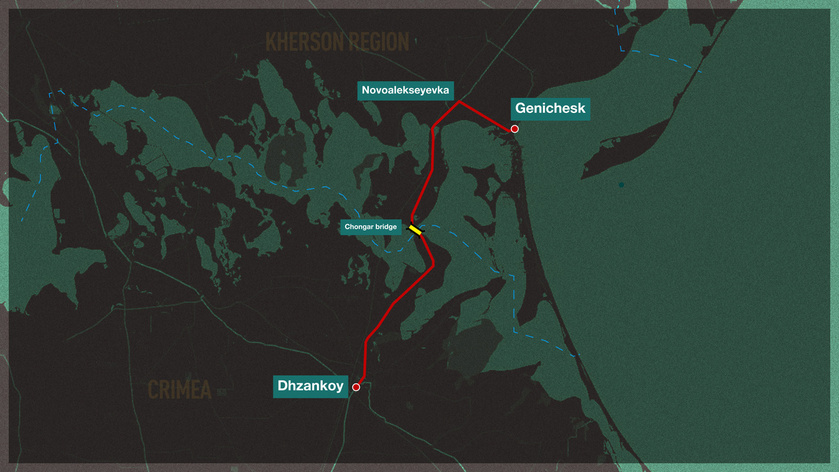
Genichesk is – literally – off the beaten path. When we reached the town of Novoalekseyevka, we got off the M18 highway and headed east along a two-lane road that took us toward the Sea of Azov. There were armed checkpoints all along the route, but the Sparta bodyguards were able to get us waved through without any issues. But the effect of these checkpoints was chilling – there was no doubt that one was in a region at war.
To call Genichesk a ghost town would be misleading – it is populated, and the evidence of civilian life is everywhere you look. The problem was, there didn’t seem to be enough people present. The city, like the region, is in a general state of decay, a holdover from the neglect it had suffered at the hands of a Ukrainian government that largely ignored territories that had, since 2004, voted in favor of the Party of Regions, the party of former President Viktor Yanukovich, who was ousted in the February 2014 Maidan coup. Nearly two years of war had likewise contributed to the atmosphere of societal neglect, an impression which was magnified by the weather – overcast, cold, with a light sleet blowing in off the water.
As we made our way into the building where the government of the Kherson Region had established its temporary offices, I couldn’t help but notice a statue of Lenin in the courtyard. Ukrainian nationalists had taken it down in July 2015, but the citizens of Genichesk had reinstalled it in April 2022, once the Russians had taken control of the city. Given Putin’s feeling about the role Lenin played in creating Ukraine, I found both the presence of this monument, and the role of the Russian citizens of Genichesk in restoring it, curiously ironic.
Vladimir Saldo is a man imbued with enthusiasm for his work. A civil engineer by profession, with a PhD in economics, Saldo had served in senior management positions in the “Khersonbud” Project and Construction Company before moving on into politics, serving on the Kherson City Council, the Kherson Regional Administration, and two terms as the mayor of the city of Kherson. Saldo, as a member of the Party of Regions, moved to the opposition and was effectively subjected to political ostracism in 2014, when the Ukrainian nationalists who had seized power all but forced it out of politics.
Aleksandr and I had the pleasure of meeting with Saldo in his office in the government building in downtown Genichesk. We talked about a wide range of issues, including his own path from a Ukrainian construction specialist to his current position as the governor of Kherson Oblast.
We talked about the war.
But Saldo’s passion was the economy, and how he could help revive the civilian economy of Kherson in a manner that best served the interests of its diminished population. On the eve of the military operation, back in early 2022, the population of the Kherson Region stood at just over a million, of which some 280,000 were residing in the city of Kherson. By November 2022, following the withdrawal of Russian forces from the right bank of the Dnieper River – including the city of Kherson – the population of the region had fallen below 400,000 and, with dismal economic prospects, the numbers kept falling. Many of those who left were Ukrainians who did not want to live under Russian rule. But others were Russians and Ukrainians who felt that they had no future in the war-torn region, and as such sought their fortunes elsewhere in Russia.
“My job is to give the people of Kherson hope for a better future,” Saldo told me. “And the time for this to happen is now, not when the war ends.”
Restoration of Kherson’s once vibrant agricultural sector is a top priority, and Saldo has personally taken the lead in signing agreements for the provision of Kherson produce to Moscow supermarkets. Saldo has also turned the region into a special economic zone, where potential investors and entrepreneurs can receive preferential loans and financial support, as well as organizational and legal assistance for businesses willing to open shop there.
The man responsible for making this vision a reality is Mikhail Panchenko, the Director of the Kherson Region Industry Development Fund. I met Mikhail in a restaurant located across the street from the governmental building which Saldo called home. Mikhail had come to Kherson in the summer of 2022, leaving a prominent position in Moscow in the process. “The Russian government was interested in rebuilding Kherson,” Mikhail told me, “and established the Industry Development Fund as a way of attracting businesses to the region.” Mikhail, who was born in 1968, was too old to enlist in the military. “When the opportunity came to direct the Industry Development Fund, I jumped at it as a way to do my patriotic duty.”
The first year of the fund’s operation saw Mikhail hand out 300 million rubles (almost $3.3 million at the current rate) in loans and grants (some of which was used to open the very restaurant where we were meeting.) The second year saw the allotment grow to some 700 million rubles. One of the biggest projects was the opening of a concrete production line capable of producing 60 cubic meters of concrete per hour. Mikhail took Alexander and me on a tour of the plant, which had grown to three production lines generating some 180 cubic meters of concrete an hour. Mikhail had just approved funding for an additional four production lines, for a total concrete production rate of 420 cubic meters per hour.
“That’s a lot of concrete,” I remarked to Mikhail.
“We are making good use of it,” he replied. “We are rebuilding schools, hospitals, and government buildings that had been neglected over the years. Revitalizing the basic infrastructure a society needs if it is to nurture a growing population.”
The problem Mikhail faces, however, is that most of the population growth being experienced in Kherson today comes from the military. The war can’t last forever, Mikhail noted. “Someday the army will leave, and we will need civilians. Right now, the people who left are not returning, and we’re having a hard time attracting newcomers. But we will keep building in anticipation of a time when the population of the Kherson region will grow from an impetus other than war. And for that,” he said, a twinkle in his eye, “we need concrete!”
I thought long and hard about the words of Vladimir Saldo and Panchenko as Aleksandr drove back onto the M18 highway, heading northeast, toward Donetsk. The reconstruction efforts being undertaken are impressive. But the number that kept coming to mind was the precipitous decline in the population – more than 60% of the pre-war population has left the Kherson region since the Russian military operation began.
According to statistics provided by the Russian Central Election Commission, some 571,000 voters took part in the referendum on joining Russia that was held in late September 2022. A little over 497,000, or some 87%, voted in favor, while slightly more than 68,800, or 12%, voted against. The turnout was almost 77%.
hese numbers, if accurate, implied that there was a population of over 740,000 eligible voters at the time of the election. While the loss of the city of Kherson in November 2022 could account for a significant source of the population drop that took place between September 2022 and the time of my visit in January 2024, it could not account for all of it.
The Russian population of Kherson in 2022 stood at approximately 20%, or around 200,000. One can safely say that the number of Russians who fled west to Kiev following the start of the military operation amounts to a negligible figure. If one assumes that the Russian population of the Kherson Region remained relatively stable, then most of the population decline came from the Ukrainian population.
While Saldo did not admit to such, the Governor of the neighboring Zaporozhya Region, Yevgeny Balitsky, has acknowledged that many Ukrainian families deemed by the authorities to be anti-Russian were deported following the initiation of the military operation (Russians accounted for a little more than 25% of the pre-conflict Zaporozhye population.) Many others fled to Russia to escape the deprivations of war.
Evidence of the war was everywhere to be seen. While the conflict in Kherson has stabilized along a line defined by the Dnieper River, Zaporozhye is very much a frontline region. Indeed, the main direction of attack of the summer 2023 Ukrainian counteroffensive was from the Zaporozhye region village of Rabotino, toward the town of Tokmak, and on towards the temporary regional capital of Melitopol (the city of Zaporozhye has remained under Ukrainian control throughout the conflict to date.)
I had petitioned to visit the frontlines near Rabotino but had been denied by the Russian Ministry of Defense. So, too, was my request to visit units deployed in the vicinity of Tokmak – too close to the front. The closest I would get would be the city of Melitopol, the ultimate objective of the Ukrainian counterattack. We drove past fields filled with the concrete “dragon’s teeth” and antitank ditches that marked the final layer of defenses that constituted the “Surovikin Line,” named after the Russian General, Sergey Surovikin, who had commanded the forces when the defenses were put in place.
The Ukrainians had hoped to reach the city of Melitopol in a matter of days once their attack began; they never breached the first line of defense situated to the southeast of Rabotino.
Melitopol, however, is not immune to the horrors of war, with Ukrainian artillery and rockets targeting it often to disrupt Russian military logistics. I kept this in mind as we drove through the streets of the city, past military checkpoints, and roving patrols. I was struck by the fact that the civilians I saw were going about their business, seemingly oblivious to the everyday reality of war that existed around them.
As was the case in Kherson, the entirety of the Zaporozhye Region seemed strangely depopulated, as if one were driving through the French capital of Paris in August, when half the city is away on vacation. I had hoped to be able to talk with Balitsky about the reduced population and other questions I had about life in the region during wartime, but this time Aleksandr’s phone could not produce the desired result – Balitsky was away from the region and unavailable.
If he had been available, I would have asked him the same question I had put to Saldo earlier in the day: given that Putin was apparently willing to return the Kherson and Zaporozhye regions to Ukraine as part of the peace deal negotiated in March 2022, how does the population of his region feel about being part of Russia today? Are they convinced that Russia is, in fact, there to stay? Do they feel like they are a genuine part of the Novorossiya that Putin speaks about?
Saldo had talked in depth about the transition from being occupied by Russian forces, which lasted until April-May 2022 (about the time that Ukraine backed out of the ceasefire agreement), to being administered by Moscow. “There never was a doubt in my mind, or anyone else’s, that Kherson was historically a part of Russia,” Saldo said, “or that, once Russian troops arrived, that we would forever be Russian again.”
But the declining population, and the admission of forced deportations on the part of Balitsky, suggests that there was a significant part of the population that had, in fact, taken umbrage at such a future.
I would have liked to hear what Balitsky had to say about this question.
Reality, however, doesn’t deal with hypotheticals, and the present reality is that both Kherson and Zaporozhye are today part of the Russian Federation, and that both regions are populated by people who had made the decision to remain there as citizens of Russia. We will never know what the fate of these two territories would have been had the Ukrainian government honored the ceasefire agreement negotiated in March 2022. What we do know is that today both Kherson and Zaporozhye are part of the “New Territories” – Novorossiya.
Russia will for some time find its acquisition of the “new territories” challenged by nations who question the legitimacy of Russia’s military occupation and subsequent absorption of the Kherson and Zaporozhye regions into the Russian Federation. The reticence of foreigners to recognize these regions as being part of Russia, however, is the least of Russia’s problems. As was the case with Crimea, the Russian government will proceed irrespective of any international opposition.
The real challenge facing Russia is to convince Russians that the new territories are as integral to the Russian motherland as Crimea, a region reabsorbed by Russia in 2014 which has seen its economic fortunes and its population grow over the past decade. The diminished demographics of Kherson and Zaporozhye represent a litmus test of sorts for the Russian government, and for the governments of both Kherson and Zaporozhye. If the populations of these regions cannot regenerate, then these regions will wither on the vine. If, however, these new Russian lands can be transformed into places where Russians can envision themselves raising families in an environment free from want and fear, then Novorossiya will flourish.
Novorossiya is a reality, and the people who live there are citizens by choice more than circumstances. They are well served by men like Saldo and Balitsky, who are dedicated to the giant task of making these regions part of the Russian Motherland in actuality, not just in name.
Behind Saldo and Balitsky are men like Panchenko, people who left an easy life in Moscow or some other Russian city to come to the “New Territories” not for the purpose of seeking their fortunes, but rather to improve the lives of the new Russian citizens of Novorossiya.
For this to happen, Russia must emerge victorious in its struggle against the Ukrainian nationalists ensconced in Kiev, and their Western allies. Thanks to the sacrifices of the Russian military, this victory is in the process of being accomplished.
Then the real test begins – turning Novorossiya into a place Russians will want to call home.

